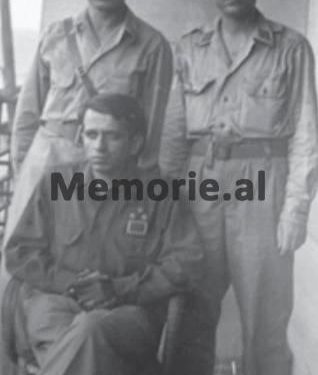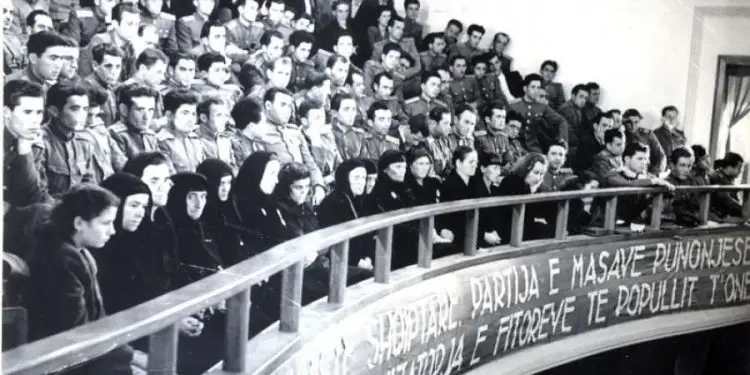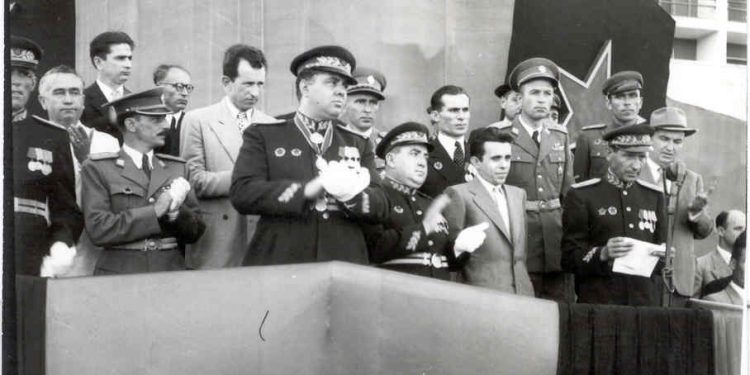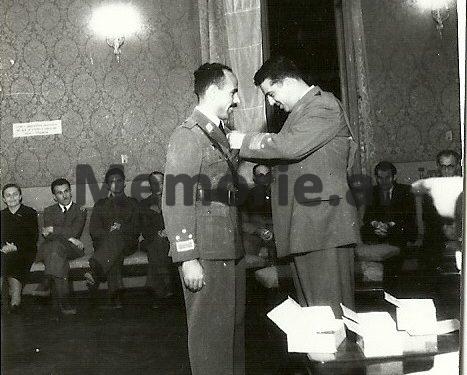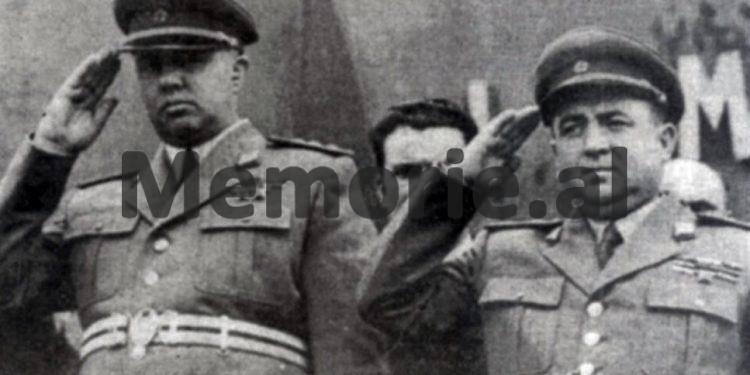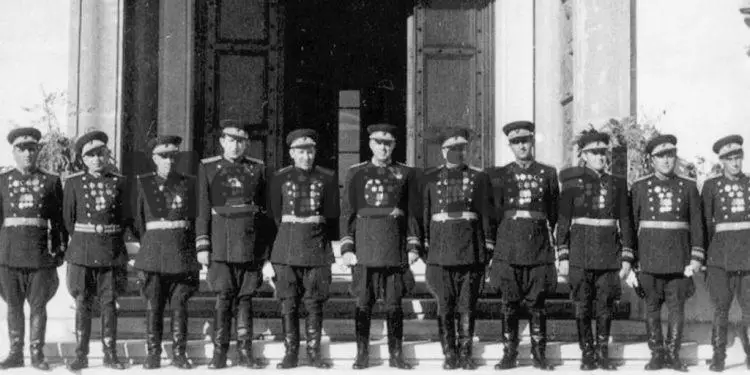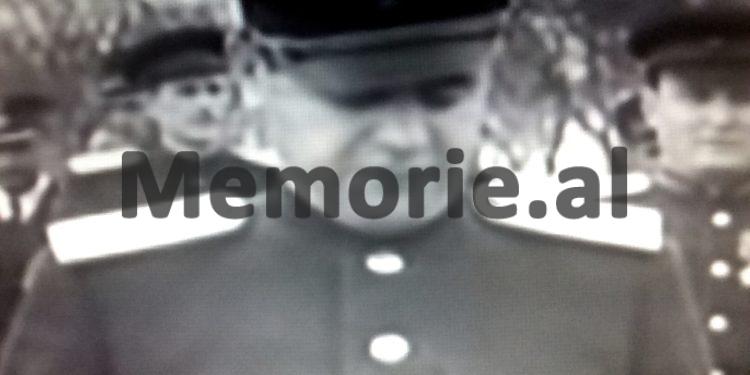Dashnor Kaloçi
Part six
Memorie.al publishes the unknown story of Major General Panajot Plakut, originally from the village of Hoçisht in Devoll, Korça, who after graduating from the “Normal” school in Elbasan in 1936, returned to the city of Korça where he joined groups. communist and during the occupation of the country 1939-1944, he joined the Anti-Fascist Movement and for his activity was arrested and imprisoned by the Italian authorities in the city of Durrës and after his release, he joined the partisan ranks, being appointed deputy commander of the First Assault Brigade commanded by Mehmet Shehu, since its formation in August 1943, in the village of Vidhkuq in Korça. How Panajot Plaku climbed the military career ladder after the end of the War, starting from Commissar and Division Commander in Korça District, Corps Commander, Director of Operational Directorate and Deputy Chief of General Staff of the Albanian Army in the Ministry of People’s Defense with rank and Major-General, Deputy Minister of National Defense for the Border Directorate, to the post of Minister without Portfolio in the government headed by Mehmet Shehu? How could Panajot Plaku escape from Albania in June 1957 (when he was acting Minister without Portfolio and Chairman of the State Committee for Geology) secretly crossing the state border near Lake Pogradec from the village of Lin and leaving for Yugoslavia? Where he settled in Belgrade as a political asylum and sent a letter to the leader of the Soviet Union, Nikita Khrushchev, denouncing all the crimes of Enver Hoxha and his regime?! The mystery of the death of Panajot Plaku in 1966 in the hotel where he lived in Belgrade and what he wrote in his memoirs about Enver Hoxha and the senior leadership of the ALP, which he summarized to be published in a book entitled ” Violence over the Revolution in Albania “, and after his death it was also translated into Serbo-Croatian (by Predrag Vuivivi,, editor of the newspaper” Borba “and Vela Popovi,, editor of Belgrade Television), a book that had a great echo and was later published by the Publishing House “Rilindja” of Prishtina in the Albanian language in 1985.
Continued from the previous issue
Memoirs of Panayot the Elder written in Belgrade from 1957 to ’66
From May 1957 when he gained the status of political asylum in Yugoslavia until June 1966, when Panajot Plaku died in a hotel in Belgrade, in completely unknown circumstances without suffering from any illness, among other things he wrote memoirs which he summarized in a special book, entitled “Violence over the revolution in Albania.” In that book he described in detail all the crimes and genocide of the communist regime in Albania and personally of Enver Hoxha, as well as the methods he used in eliminating his comrades, from the time of the War until 1966. From this a book which was published about 20 years after his death, by the abbey of the Publishing House “Rilindja” in Prishtina, (under the tutelage of two journalists Predrag Vukovi,, editor of the newspaper “Borba” and Vela Popovi,, editor of Belgrade TV), Memorie.al has selected some parts that we are publishing starting from the following article.
Panjot Plaku: Who was Enver Hoxha?
The main characteristics of Enver Hoxha, listed in the letter (Nako Spiro’s letter, sent to the Yugoslav leadership), are completely correct. He has always been among those who did not have certain orientations. I will point out a detail that does not seem important, but it seems to me that it illustrates well exactly this characteristic of Enver Hoxha. As a high school student in Korça, he was known among his friends only for the fact that he looked beautiful. But this handsome and strong guy was weak, even in sports and gymnastics. But he also showed these characteristics in intellectual education.
During his studies in France, he had only average and poor grades in college. This is why his later life may be one of the motives for his unscrupulous behavior. Here are some details: At the First Congress of the Communist Party of Albania, I was sitting at the far right of the penultimate row, under the balcony of the Congress hall. Sotir Vulkani was sitting next to me. When the meeting was over, we both got up and left the exit. At the door, Sotir Vulkani motioned for me to wait.
He took quick steps to reach Enver Hoxha, who was walking in front of us. I saw them go up the stairs together, towards the upper cupboard. When I thought that Sotir would not return and went down the stairs, he reached me and with obvious longing and surprise said: “I advised Enver to give up following Koçi Xoxa and I added: You both made him all of these things together, and therefore together you have to fix them. Should we hang Koçi now, because of this issue? I was surprised “, said then Sotir Vulkani, because Enver just looked at me noticed and without a word left, leaving me on the stairs.
Immediately after the Congress, Sotir Vulkani, who until then held an important position in the Ministry of Internal Affairs (chief of staff service, with the rank of lieutenant colonel), was left without ranks, received a severe sentence by the Party and was found in a very difficult material condition, in which he remained for several years, until he was given the former rank and duty of director of the prison, where his comrades were tortured, by the Communist Group of Korça (Pandi Kristo and others).
Enver’s infidelity!
The whole subsequent practice of Enver Hoxha, shows that this behavior of his was not extraordinary, but that it resulted from his character, which later had even more dramatic and even tragic consequences in my country. The whole National Liberation War after the First Conference of the country shows not only the limited abilities of Enver Hoxha, but also his fluctuations, indecision and opportunism. He himself has admitted this several times and has emphasized it as his own vices (in the Berat Plenum, in the eighth Plenum, and others). Given the position in which he found himself, it is clear that with such characteristics he has done extremely great damage to the Party and the wartime revolution.
But these damages are almost insignificant in comparison with the terrible consequences of these qualities of his in the later period, when near them were no longer the best men of the revolution, who could prevent the extreme manifestations of the weaknesses of severe of his character. After Stalin interfered in the internal affairs of Albania and after the promulgation of the Informbureau Resolution, Enver Hoxha began to gradually seize all power in his own hands.
At that time he began to mercilessly settle accounts with his best friends, even with those like Koçi Xoxe, whom he called in the VIII Plenum, in February 1948, as: “Excellent epicenter of the proletarian core of the Albanian leadership ”. Nine months later, at the First Congress of the Communist Party of Albania, the same Koçi Xoxe, declared the “Epicenter of the blackest faction in the leadership of the Communist Party of Albania and the greatest traitor”! As it is known, shortly after the First Congress, Enver Hoxha arrested this revolutionary, convicted him and shot him.
From Enver Hoxha’s consciousness begins to emerge more and more his greatest vice, in which two components are dominant: the fear of losing power and the desire to be the only decisive factor in the leadership of Albanian Labor Party. At that time, all the mentioned vices of Enver Hoxha’s character must be added to the no less dangerous and even more bloodthirsty vices, of his “beloved” collaborator, Mehmet Shehu!
Although it is well known that they have never personally endured each other, it was their cooperation that brought the greatest evils to the people of Albania. For their relationship, testifies, among other things, a letter from Enver Hoxha, sent to Dushan Mugosha: where he writes: “Dear friend Dushan Mugosha. Now I am stronger than the day we parted, but the longing is always great. Ali (Miladin Popovic St. P.P.) was stronger than us, no matter how much he guessed, he knew how much the division affected him. Not us, but everyone was affected.
Dr. Nishani started to cry, saying: ‘I remember the vile things that the enemy said about Dushan and Ali, about these two so good and determined friends, who left their families, their country and came to help us, to fight together with us ‘. But let’s talk a little about work. Almost everyone has come here: Tuku, Besnik, Hulo, Dalin, Beqir Balluku, Nexhipi, Pëllumbi, etc. Nakua and Shule have not arrived yet. We started doing some conferences with them. Tuku started with Besnik, public conferences on the actions of the Brigade, the attitude of the partisans, etc. We will start a small course in the form of conferences with the following topics:
“Imperialist war, first and second, just and unjust war”, “Party in the army”, “Organization of power”, “National Liberation War” and we will organize some military courses.
Tuku is not very happy with Mehmeti (do not assume that I am writing this post post deadline and with a tendency). But Tuku reports and says that: since Saliu left (illegal name of Dushan Mugosha P.P.), Mehmeti does not weigh anyone, before the meeting of the Brigade he underestimated the action against Haki Blloshmi and that of Pogradec. He gave strange and non-social orders to Tuk, and many other things. All this, do not be afraid, we will see them with cold blood, without prejudice and we will act as we decided. Congressional elections are being held successfully in the free zones, but we fear that very few will come to us from the occupied zones. We will announce the development of things. Just write to us always.
Taras embraces you with great longing (Illegal name of Enver Hoxha, St. P.P.)
Enver’s quarrel with Mehmet!
Here is another detail, which shows what the relations between Enver Hoxha and Mehmet Shehu were. About ten years ago, when Mehmet Shehu was dismissed from the post of second secretary of the Central Committee and appointed prime minister, he, suspecting the motives of this change, thought that this could be the first step towards the liquidation of his. This was the cause of serious conflicts between the two in several meetings of the Politburo. However, since the decision was not implemented, Mehmet Shehu was locked in his villa, where he remained for a very long time, guarded by his most loyal partisans of Mallakasta (his birthplace).
After these quarrels with Enver, Sadik Bocaj and I told him that he was almost fleeing to the mountains! Since the conflict was not eliminated in several meetings of the Politburo, but became more and more aggravating, Mehmet Shehu went to the then Soviet ambassador and complained against Enver Hoxha. After that, the Soviet ambassador met with Enver Hoxha. A meeting of the three was organized, in which Enver Hoxha and Mehmet Shehu agreed. Much later, Mehmet Shehu told in the form of self-criticism about these events in the Central Committee, but in a much softer way.
These two, who had never tolerated each other, later formed a “holy alliance”, built on the blood of thousands of the best communists, patriots and innocent people of Albania, in order to force the people of Albania to change the most generous goals of socialism, with semi-fascist slogans, such as: “In one hand the pickaxe, in the other hand the rifle”.
Rehabilitation of Mehmet Shehu!
In the X Plenum of the Central Committee of the Communist Party of Albania, which was held after the announcement of the Informbureau Resolution, Albania severely attacked Yugoslavia, blaming it for the non-implementation of the program and other orders. At that time the works in all the large facilities that were under construction were stopped and the decision was made to reduce the ration of bread and other food items that were given to the people. The market began to empty.
By carrying out Stalin’s directives, the Albanian government was preparing for the aggravation and severance of relations with Yugoslavia, and the Albanian people began to feel at their own expense the consequences of such an unnatural and harmful course of Enver Hoxha. In those conditions, the XI Plenum of the Central Committee of the Communist Party of Albania was held, in which Yugoslavia was attacked quite openly. In this Plenum also began the campaign against those members of the leadership, who were committed to the continuation of close relations with Yugoslavia.
Rehabilitated: Nako Spiru, Liri Belishova, Kiço Ngjela and Mehmet Shehu. At the same time, were convicted: Koçi Xoxe (who was dismissed from the position of organizational secretary, but remained a member of the Politburo), and then Pandi Kristo and Kristo Themelko (who were expelled from the Politburo, but remained members of the Central Committee), while Xhorxhi Blushi and Nesti Kerenxhi (both candidates for members of the Politburo) and Vaskë Koleci, a member of the Central Committee, were expelled from the Central Committee of the Communist Party of Albania.
In this Plenum, which was held from the 13th to the 24th of September 1948, it was decided that the First Congress of P.K. of Albania, to be held during November of the same year. After the Plenum, without any questions and any further discussion, Koçi Xoxe, Pandi Kristo, Kristo Themelko, Nesti Kerenxhi and others were dismissed from all party and state functions and were completely isolated from political and party work. The measures that had been taken in the XI Plenum were not enough for Stalin, so now these measures had been taken on the basis of his direct order, how to deal with this group of prominent leaders. In October 1948, Ramadan Çitaku, who had until then been the ambassador of the People’s Republic of Albania to Yugoslavia, was invited to present to the Politburo a report on relations between the two countries.
Enver’s quarrel with Çitak!
During the conversation that took place in the Politburo, Ramadan Çitaku spoke about the impressions he had brought from Yugoslavia, emphasizing that while he was in Yugoslavia, he had not noticed any changes on the Yugoslav side in terms of relations and policy towards Albania. However, Enver Hoxha, who had expected that after so many attacks by the propaganda apparatus of Albania, the USSR and other socialist countries against Yugoslavia, Ramadan Çitaku would combine his report with arguments to make those attacks credible, interrupted his reference, saying, among other things, that: he must take into account the fact that Tito is a “traitor.”
Despite this digression, Ramadan Çitaku continued to read his report, continuing to describe his impressions of Yugoslavia. Enver Hoxha, in a brutal tone, interrupted him once again, saying: “Tito is a traitor, and I am the secretary of your Party”. Ramadan Çitaku replied that, in his report, nowhere did he deny that Enver Hoxha is the secretary of the Communist Party of Albania and added: “But, I am a communist and as such in my report, I have presented only my real impressions from Yugoslavia. I can neither say nor testify, what Enver Hoxha demands from me “. Then the meeting was interrupted. Ramadan Çitaku (who until then was a member of the Politburo), was expelled not only from the Central Committee and the Communist Party of Albania, but was also dismissed from all state functions, which was later formally verified in the Congress. First of the Communist Party of Albania. Memorie.al
The next issue follows




